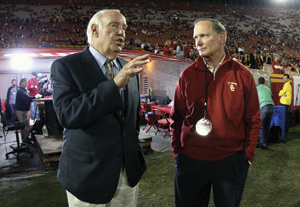Ibelieve a watershed moment is occurring in the world of college athletics as we witness a shift in business approach by athletic departments to embrace a number of pro sports concepts and adapt them to their needs. This change is focused on using technology and innovation to increase revenue for the program while better serving sophisticated season-ticket holders and donors, ultimately creating financial benefits that help them expand their programs and better serve their student athletes and universities.
One example beginning to gain traction in college athletics over the past two years is the staffing of both inbound and outbound commissionable sales teams, a strategy that every pro sports team relies on today. Pioneers like Matt DiFebo, formerly of the University of Central Florida and now with IMG Tickets, and Bernie Mullin, formerly of the NBA and now with The Aspire Group, realized success with several colleges looking to capture improved sales and renewals. Now, increasing numbers of programs are either working with a partner or building their own team internally, such as Florida State University and University of Arizona.
From this trend evolved the concept of using customer relationship management systems within college athletics to share information between ticket sales, fundraising and marketing. Gone are the days of white boards and sticky notes for sales teams; they are being replaced by sophisticated CRM platforms to better manage fan and donor relationships with immediate access to the entire management team.
To make this happen these leaders in collegiate sports are bringing with them experience from both the professional and the business worlds, and here are three great examples:
■ Arizona State Athletic Director Steve Patterson is the former president of the Portland Trail Blazers. He and Associate AD Steve Hank have an outbound sales team and a fully integrated CRM system to maximize the team’s efforts. To refine and optimize their sales efforts, ASU took another page out of the pro sports play book by implementing sophisticated database profiling and lead-scoring techniques through a partnership with Turnkey Intelligence. ASU’s sales teams prioritize leads into ranked categories and target fans most likely to purchase. To help measure many of their sophisticated programs, ASU then implemented a data warehouse solution that allows it to quickly identify ticketing, fundraising and marketing trends and pull together information from previously disparate databases at the school through an executive, graphical dashboard. This enables the sales team to make data-driven decisions to maximize results.
■ Dave Brandon brought his experience as CEO of Domino’s to the University of Michigan when he was hired as AD in 2010. At Brandon’s side is an agent of change, CMO Hunter Lochmann, who came to Michigan from the New York Knicks. In fact, the concept of the chief marketing officer role, while prevalent in pro sports, is new within the college athletics ranks. Together, Brandon and Lochmann have quickly implemented several exciting new initiatives that one would expect from a Fortune 500 brand or a professional sports franchise. Michigan not only now boasts the largest mobile marketing database in college athletics, but it also has quickly embraced sophisticated digital marketing, ticketing and social media strategies to better engage and interact with Wolverine fans. Michigan also owns the most successful social media ticket sales campaign of record, selling $86,000 in ticket sales in a single day through a Facebook-only presale.
 |
Under the direction of Pat Haden (right), USC has partnered with StubHub for integrated ticket resale.
Photo by: GETTY IMAGES
|
■ Under the direction of AD Pat Haden, the University of Southern California has implemented several new groundbreaking initiatives including an integrated ticket resale solution with industry leader StubHub. Although pervasive in the professional sports world, college athletics organizations waited to embrace this trend until just recently. The opportunity of providing fans the ability to instantly post and resell their unused tickets online while delivering a guaranteed, valid new ticket to the buyer is a great proposition for many universities. Fans get great tickets, universities fill seats and gain access to new customers, and the university has additional money to fund its mission. USC also recently implemented a CRM system to complement its integrated ticketing, marketing and fundraising efforts so it can better manage and segment all the new fans in the school’s database.
So what is the next big idea that was born in professional sports and is about to take college athletics by storm?
I believe it is dynamic pricing. Although the landscape in college athletics is very different than professional sports, including far fewer home games and the element of required donations for premium seating, there is an unbelievable opportunity to exercise more efficient pricing. The University of South Florida was the first college athletics institution to implement true dynamic pricing, not just variable pricing, last football season — the difference being variable pricing takes place before the season begins, assigning a higher value to marquee games, while dynamic pricing happens during the season, allowing teams to flex pricing based on demand for remaining inventory.
In a survey of more than 105 Paciolan college athletics clients executed by Turnkey Intelligence, we found that 26 percent of all college athletics institutions reported they are “moderately or more than likely” to adopt dynamic pricing within the next year. This represents an amazing opportunity for colleges to realize the actual market value of their tickets. Several large BCS schools are now evaluating this technology with partners such as QCue and Digonex.
It is a tremendously exciting time in our industry. As more college athletics organizations embrace these new pro sports concepts, it opens numerous new opportunities to drive increased revenue, better serve fans and donors, and energize the community around funding the student athletes we all enjoy cheering for on the field and in the arena.
Dave Butler (DButler@paciolan.com) is CEO of Paciolan.





